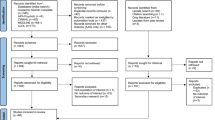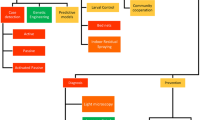Abstract
Aim
This study aims to examine the factors affecting the uptake of malaria prevention strategies among pregnant women in Nigeria.
Methods
Secondary data from the 2013 Nigeria Demographic and Health Survey were used to examine the factors affecting the uptake of malaria prevention strategies among pregnant women (n = 4493) in Nigeria. Variables on demographic and socio-economic characteristics of pregnant women were analysed. Data analysis was carried out using STATA version 12 software and univariate, bivariate and multivariate analyses were conducted.
Results
We found that only 10.3% of pregnant women received intermittent preventive treatment of malaria in pregnancy, while 17.4% used insecticide-treated bed nets. Multivariate analysis indicated that maternal age (p < 0.05), geo-political zone (p < 0.05), socio-economic status (p < 0.05), religion (p < 0.05), women’s autonomy (p < 0.05) and number of antenatal care visits (p < 0.05) were significant predictors of the uptake of intermittent preventive treatment of malaria in pregnancy. The use of insecticide-treated bed nets was influenced by socio-economic status (p < 0.05) and women’s occupation (p < 0.05).
Conclusion
Our study shows that there is poor uptake of malaria prevention strategies among pregnant women in Nigeria. In addition, demographic and socio-economic factors affect the uptake of malaria prevention strategies. The design of new policies and improvement in the current malaria prevention programs should target demographic and socio-economic factors which are important in increasing the uptake of malaria prevention strategies among pregnant women. We also recommend economic empowerment of women.
Similar content being viewed by others
Change history
30 January 2018
The journal had been advised to revise the title so that Clarivate Analytics can try to count the citations more accurately. There’s been confusion due to the existence of another journal with the same name.
References
Aday LA, Andersen RM (1974) A framework for the study of access to medical care. Health Serv Res 9:208–220
Adigun AB, Gajere EN, Oresanya O, Vounatson P (2015) Malaria risk in Nigeria: Bayesian geostatistical modelling of 2010 Malaria Indicator Survey data. Malar J 14(156):1–8. https://doi.org/10.1186/s12936-015-0683-6
Agomo CO, Oyibo WA (2013) Factors associated with risk of malaria infection among pregnant women in Lagos, Nigeria. Infect Dis Poverty 2(19):1–18. https://doi.org/10.1186/2049-9957-2-19
Aluko JO, Oluwatosin AO (2012) Utilization of insecticide treated nets during pregnancy among postpartum women in Ibadan, Nigeria: a cross-sectional study. BMC Pregnancy Childbirth 12(21):1–7. https://doi.org/10.1186/1471-2393-12-21
Ankomah A, Adebayo SB, Arogundade ED, Anyanti J, Nwokolo E, Ladipo O, Meremikwu MM (2012) Determinants of insecticide-treated net ownership and utilization among pregnant women in Nigeria. BMC Public Health 12(105):1–10. https://doi.org/10.1186/1471-2458-12-105
Asa OO, Onayade AA, Fatusi AO, Ijadunola KT, Abiona TC (2008) Efficacy of intermittent preventive treatment of malaria with sulphadoxine-pyrimethamine in preventing anaemia in pregnancy among Nigerian women. Matern Child Health J 12(6):692–698. https://doi.org/10.1007/s10995-008-0319-3
Belay M, Deressa W (2008) Use of insecticide treated nets by pregnant women and associated factors in a pre-dominantly rural population in northern Ethiopia. Tropical Med Int Health 13(10):1303–1313. https://doi.org/10.1111/j.1365-3156.2008.02159.x
Chikwasha V, Phiri I, Chimberengwa P, Bangure D, Rusakaniko S (2014) Predictors of IPTp uptake among pregnant women in the 2010–2011 Zimbabwe demographic and health survey. DHS working papers no. 112 (Zimbabwe working papers no. 13). ICF Int., Rockville, MD
Choonara S, Odimegwu CO, Elwange BC (2015) Factors influencing the usage of different types of malaria prevention methods during pregnancy in Kenya. Afr Health Sci 15(2):413–419. https://doi.org/10.4314/ahs.v15i2.14
Dawaki S, Al-Mekhlafi HM, Ithoi J, Ibrahim J, Atroosh WM, Abdulsalam AM et al (2016) Is Nigeria winning the battle against malaria? Prevalence, risk factors and KAP assessment among Hausa communities in Kano state. Malar J 15(351):1–14. https://doi.org/10.1186/s12936-016-1394-3
Dellicour S, Tatem AJ, Guerra CA, Snow RW, ter Kuile FO (2010) Quantifying the number of pregnancies at risk of malaria in 2007: a demographic study. PLoS Med 7(1):e1000221. https://doi.org/10.1371/journal.pmed.1000221
Eisele TP, Larsen DA, Anglewicz PA, Keating J, Yukich J, Bennett A, Hutchinson P, steketee RW (2012) Malaria prevention in pregnancy, birthweight and neonatal mortality: a meta-analysis of 32 national cross-sectional datasets in Africa. Lancet Infect Dis 12(12):942–949. https://doi.org/10.1016/S1473-3099(12)70222-0
Ezire O, Adebayo SB, Idogho O, Bamgboye EA, Nwokolo E (2015) Determinants of use of insecticide-treated nets among pregnant women in Nigeria. Int J Womens Health 7:655–661. https://doi.org/10.2147/IJWH.S77807
Falade CO, Yusuf BO, Fadero FF, Mokuolu OA, Hamer DH, Salako LA (2007) Intermittent preventive treatment with sulphadoxine-pyrimethamine is effective in preventing maternal and placental malaria in Ibadan, south-western Nigeria. Malar J 6(88):1–8. https://doi.org/10.1186/1475-2875-6-88
Fana SA, Bunza MD, Anka SA, Imam AU, Nataala SU (2015) Prevalence and risk factors associated with malaria infection among pregnant women in a semi-urban community of north-western Nigeria. Infect Dis Poverty 4(24):1–5. https://doi.org/10.1186/s40249-015-0054-0
Federal Ministry of Health & National Malaria Control Programme (2008) Strategic plan 2009–2013: a road map for malaria control in Nigeria. http://www.nationalplanningcycles.org/sites/default/files/country_docs/Nigeria/nigeria_draft_malaria_strategic_plan_2009-2013.pdf. Accessed 02 Sept 2017
Federal Ministry of Health & Roll Back Malaria (2013) National Malaria strategic plan 2014–2020. http://www.nationalplanningcycles.org/sites/default/files/planning_cycle_repository/nigeria/nigeria_national_malaria_strategic_plan.pdf. Accessed 02 Sept 2017
Gamble CL, Ekwaru JP, ter Kuile FO (2006) Insecticide-treated nets for preventing malaria in pregnancy. Cochrane Database Syst Rev 2:CD003755
Getachew M, Yewhalaw D, Tafess K, Getachew Y, Zeynudin A (2012) Anaemia and associated risk factors among pregnant women in Gilgel Gibe Dam area, Southwest Ethiopia. Parasit Vectors 5(296):1–8. https://doi.org/10.1186/1756-3305-5-296
Gikandi PW, Noor AM, Gitonga CW, Ajanga AA, Snow RW (2008) Access and barriers to measures targeted to prevent malaria in pregnancy in rural Kenya. Tropical Med Int Health 13:208–217. https://doi.org/10.1111/j.1365-3156.2007.01992.x
Hill J, Hoyt J, van Eijk AM, D’Mello-Guyett L, ter Kuile FO, Steketee R, Smith H, Webster J (2013) Factors affecting the delivery, access, and use of interventions to prevent malaria in pregnancy in sub-Saharan Africa: a systematic review and meta-analysis. PLoS Med 10(7):e1001488. https://doi.org/10.1371/journal.pmed.1001488
Manirakiza A, Serdouma E, Djalle D, Soula G, Laganier R, Madji N, Moyen M, Le Faou A, Delmont J (2011) Relatively low prevalence of peripheral and placental plasmodium infection at delivery in Bangui, Central African Republic. J Trop Med 434816:1–6. https://doi.org/10.1155/2011/434816
Muhumuza NN, Balugaba BE, Namata J, Kiracho EE (2016) Factors associated with use of malaria control interventions by pregnant women in Buwunga subcounty, Bugiri District. Malar J 15:342. https://doi.org/10.1186/s12936-016-1407-2
Murray CJ, Ortblad KF, Guinovart C, Lim SS, Wolock TM, Roberts DA et al (2014) Global, regional, and national incidence and mortality for HIV, tuberculosis, and malaria during 1990–2013: a systematic analysis for the global burden of disease study 2013. Lancet 384:1005–1070. https://doi.org/10.1016/S0140-6736(14)60844-8
Napoleon RP, Anyangu AS, Omolacan J, Ongus JR (2011) Preventing malaria during pregnancy: factors determining the use of insecticide-treated bed nets and intermittent preventive therapy in Juba. South Sudan Med J 4(2):33–38
National Population Commission (NPC) [Nigeria] and ICF International (2014) Nigeria Demographic and Health Survey 2013. NPC and ICF Int., Abuja, Nigeria
Newman RD, Parise ME, Slutsker L, Nahlen B, Steketee RW (2003) Safety, efficacy and determinants of effectiveness of antimalarial drugs during pregnancy: implications for prevention programmes in plasmodium falciparum-endemic sub-Saharan Africa. Tropical Med Int Health 8(6):488–506. https://doi.org/10.1046/j.1365-3156.2003.01066.x
Nosten F, McGready R, d’Alessandro U, Bonell A, Verhoeff F, Menendez C, Mutabingwa T, Brabin B (2006) Antimalarial drugs in pregnancy: a review. Curr Drug Saf 1(1):1–15. https://doi.org/10.2174/157488606775252584
Ogunsanmi O, Essang A, Olaoye T, Solademi A, Makinde M (2016) nets usage and barriers among pregnant women attending ante-natal clinic in Ogun State, Nigeria. Eur Sci J 12(30):67–78. 10.19044/esj.2016.v12n30p67
Onyeneho NG, Idemili-Aronu N, Okoye I (2014) Compliance with intermittent presumptive treatment and insecticide treated nets use during pregnancy in Enugu state. Matern Child Health J 18(5):1169–1175. https://doi.org/10.1007/s10995-013-1347-1.
Protas J, Tarimo D, Moshiro C (2016) Determinants of timely uptake of ITN and SP (IPT) and pregnancy time protected against malaria in Bukoba, Tanzania. BMC Res Notes 9:318. https://doi.org/10.1186/s13104-016-2122-3
Rogerson SJ, Chaluluka E, Kanjala M, Mkundika P, Mhango C, Molyneux ME (2000) Intermittent sulphadoxine-pyrimethamine in pregnancy: effectiveness against malaria morbidity in Blantyre, Malawi, in 1997-̄99. Trans R Soc Trop Med Hvg 94(5):549–553. https://doi.org/10.1016/S0035-9203(00)90083-X
Schultz LJ, Steketee RW, Macheso A, Kazembe P, Chitsulo L, Wirima JJ (1994) The efficacy of antimalarial regimens containing sulphadoxine-pyrimethamine and/or chloroquine in preventing peripheral and placental plasmodium falciparum infection among pregnant women in Malawi. Am J Trop Med Hyg 51(5):515–522. https://doi.org/10.4269/ajtmh.1994.51.515
Shulman CE, Dorman EK, Cutts F, Kawuondo K, Bulmer JN, Peshu N, Marsh K (1999) Intermittent sulphadoxine-pyrimethamine to prevent severe anaemia secondary to malaria in pregnancy: a randomised placebo-controlled trial. Lancet 353(9153):632–636. https://doi.org/10.1016/S0140-6736(98)07318-8
Sikambale C, Halwindi H, Baboo KS (2013) Factors influencing utilization of intermittent preventive treatment of malaria (IPTp) services by pregnant women in Sesheke District of Western Province Zambia. Med J Zambia 40(1):24–32
Steketee RW, Nahlen BL, Parise ME, Menendez C (2001) The burden of malaria in pregnancy in malaria endemic areas. Am J Trop Med Hyg 64(1–2 Suppl):28–35
Stephen AA, Wurapa F, Afari EA, Sackey SO, Malm KL, Nyarko KM (2016) Factors influencing utitilization of intermittent preventive treatment for pregnancy in the Gushegu district, Ghana, 2013. Pan Afr Med J 25(Supp 1):1–4. 10.11604/pamj.supp.2016.25.1.6169
Tobin-West CI, Kanu EN (2016) Factors influencing the use of malaria prevention methods among women of reproductive age in peri-urban communities of Port Harcourt city, Nigeria. Niger Postgrad Med J 23:6–11. https://doi.org/10.4103/1117-1936.180114
Ugwu EO, Ezechukwu PC, Obi SN, Ugwu AO, Okeke TC (2013) Utilization of insecticide treated nets among pregnant women in Enugu, South Eastern Nigeria. Niger J Clin Pract 16(3):292–296. https://doi.org/10.4103/1119-3077.113449
US Embassy in Nigeria (2011) Nigeria malaria fact sheet. http://photos.state.gov/libraries/nigeria/231771/Public/December-MalariaFactSheet2.pdf. Accessed 02 Sept 2017
Verhoeff FH, Brabin BJ, Chimsuku L, Kazembe P, Russell WB, Broadhead RL (1998) An evaluation of the effects of intermittent sulfadoxine-pyrimethamine treatment in pregnancy on parasite clearance and the risk of low birth weight in Malawi. Ann Trop Med Parasitol 92(2):141–150. https://doi.org/10.1080/00034989859979
Wang H, Bhutta ZA, Coates MM, Coggeshall M, Dandona L, Diallo K et al (2016) Global, regional, national and selected subnational levels of stillbirths, neonatal, infant and under 5 mortality, 1980–2015: a systematic analysis for the global burden of disease study 2015. Lancet 388:1725–1774. https://doi.org/10.1016/S0140-6736(16)31575-6
World Health Organization (2010) Guidelines for the treatment of malaria, 2nd edn. http://www.mchip.net/sites/default/files/03.%20%20WHO%20Guidance%20for%20MIP%20Prevention%20and%20Treatment.pdf. Accessed 02 Sept 2017
World Health Organization (2016) World Malaria report 2016. http://apps.who.int/iris/bitstream/10665/252038/1/9789241511711-eng.pdf. Accessed 02 Sept 2017
Yusuf OB, Akinyemi JO, Fagbamigbe AF, Ajayi IO, Bamgboye EA, Ngige E, Issa K, Abatta E, Ezire O, Amida P, Bashorun A (2016) Controlling malaria in pregnancy: how far from the Abuja targets? Malaria World J 7(7):1–8
Funding
There was no funding support for the study.
Author information
Authors and Affiliations
Corresponding author
Ethics declarations
Conflict of interest
The authors declare that they have no conflict of interest.
Ethical approval
In obtaining the micro data, a request was made on the DHS program website on September 8, 2017 and approval was granted to download the data on the same day.
Additional information
The original version of this article was revised: Due to the existence of another journal with the same name, the Publisher has added a subtitle, “From Theory to Practice.” Effective as of January 2018, the new title of this Journal is Journal of Public Health: From Theory to Practice.
Electronic supplementary material
ESM 1
(DTA 495 kb)
Rights and permissions
About this article
Cite this article
Aregbeshola, B.S., Khan, S.M. Factors affecting the uptake of malaria prevention strategies among pregnant women in Nigeria: evidence from 2013 Nigeria demographic and health survey. J Public Health (Berl.) 26, 399–408 (2018). https://doi.org/10.1007/s10389-017-0877-1
Received:
Accepted:
Published:
Issue Date:
DOI: https://doi.org/10.1007/s10389-017-0877-1




